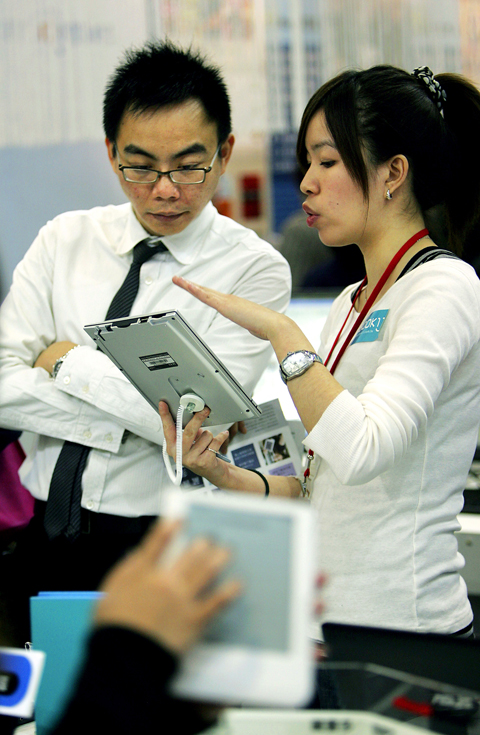Despite an aggressive push by Taiwanese makers and publishers in the electronic book world, an industry tracker said the market may only mature in another two years.
The e-book market has begun to make waves, but the market is in a mess as e-reader formats and user interfaces are not standardized, Topology Research Institute (拓墣產業研究所) said in a report on Wednesday.
“It is an uphill task for companies to turn a profit in the short term,” the researcher said.

PHOTO: WALLY SANTANA, AP
To gain a foothold in the emerging Chinese-language e-book market, players must find a synergy with their peers in China and introduce uniform standards. Hardware and software must also be better integrated to appeal to book readers, it said.
It will take another one to two years for the market to restructure and mature, the report said.
DEBUT
BenQ Corp (明基) debuted its first e-reader on Tuesday, as well as a digital content database “eBook Taiwan” (伊博數位書屋).
The 15cm, 250g “nReader” carries a price tag of NT$8,990 (US$272) and was featured at the 18th annual Taipei Book Exhibition, which finishes at the Taipei World Trade Center today.
BenQ has collaborated with a Japanese partner for technology licensing for eBook Taiwan, which boasts some 10,000 titles.
Currently, digital content is only in e-reader format, but BenQ said it would launch formats so that the content could be read on notebooks and mobile phones in the future.
BenQ expects 100,000 e-readers will be sold in Taiwan this year, and the firm is aiming to seize more than half of the market, BenQ vice president Jerry Wang (王文璨) told reporters during the launch of the e-reader.
The bulk of nReader sales would be in China, where the company plans to introduce a third-generation model next month. The firm is cooperating with Chinese telecoms operators and is targeting selling 300,000 units this year, Wang said.
L&B
Meanwhile, digital database platform provider Asiaworld Digital Technology Co (碩亞數碼科技) has also moved into the digital book world by launching an e-reader system called L&B (Library & Book) on Wednesday.
The L&B platform is targeted at library operators, offering a digital archive of almost 100,000 titles, Chris Huang (黃識恩) said.
So far, the company has sold the L&B system and its content to more than 90 educational institutions and it is looking to work with e-reader manufacturers, such as BenQ and Asustek Computer Inc (華碩), to further promote its solution, he said.
Also showcasing an e-reader at the book fair was Yuan-Liou Publishing Co (遠流出版).
Scheduled to debut in April, the “Jin Yong Reader” comes with all 36 martial arts titles written by renowned Hong Kong-based author Louis Cha (查良鏞) — better known as Jin Yong (金庸) — in electronic format.
Designed by Koobe Inc, the 15cm model will cost about NT$12,000 with the 36 titles pre-loaded, a company executive said.

Real estate agent and property developer JSL Construction & Development Co (愛山林) led the average compensation rankings among companies listed on the Taiwan Stock Exchange (TWSE) last year, while contract chipmaker Taiwan Semiconductor Manufacturing Co (TSMC, 台積電) finished 14th. JSL Construction paid its employees total average compensation of NT$4.78 million (US$159,701), down 13.5 percent from a year earlier, but still ahead of the most profitable listed tech giants, including TSMC, TWSE data showed. Last year, the average compensation (which includes salary, overtime, bonuses and allowances) paid by TSMC rose 21.6 percent to reach about NT$3.33 million, lifting its ranking by 10 notches

Popular vape brands such as Geek Bar might get more expensive in the US — if you can find them at all. Shipments of vapes from China to the US ground to a near halt last month from a year ago, official data showed, hit by US President Donald Trump’s tariffs and a crackdown on unauthorized e-cigarettes in the world’s biggest market for smoking alternatives. That includes Geek Bar, a brand of flavored vapes that is not authorized to sell in the US, but which had been widely available due to porous import controls. One retailer, who asked not to be named, because

SEASONAL WEAKNESS: The combined revenue of the top 10 foundries fell 5.4%, but rush orders and China’s subsidies partially offset slowing demand Taiwan Semiconductor Manufacturing Co (TSMC, 台積電) further solidified its dominance in the global wafer foundry business in the first quarter of this year, remaining far ahead of its closest rival, Samsung Electronics Co, TrendForce Corp (集邦科技) said yesterday. TSMC posted US$25.52 billion in sales in the January-to-March period, down 5 percent from the previous quarter, but its market share rose from 67.1 percent the previous quarter to 67.6 percent, TrendForce said in a report. While smartphone-related wafer shipments declined in the first quarter due to seasonal factors, solid demand for artificial intelligence (AI) and high-performance computing (HPC) devices and urgent TV-related orders

Prices of gasoline and diesel products at domestic fuel stations are this week to rise NT$0.2 and NT$0.3 per liter respectively, after international crude oil prices increased last week, CPC Corp, Taiwan (台灣中油) and Formosa Petrochemical Corp (台塑石化) said yesterday. International crude oil prices last week snapped a two-week losing streak as the geopolitical situation between Russia and Ukraine turned increasingly tense, CPC said in a statement. News that some oil production facilities in Alberta, Canada, were shut down due to wildfires and that US-Iran nuclear talks made no progress also helped push oil prices to a significant weekly gain, Formosa said